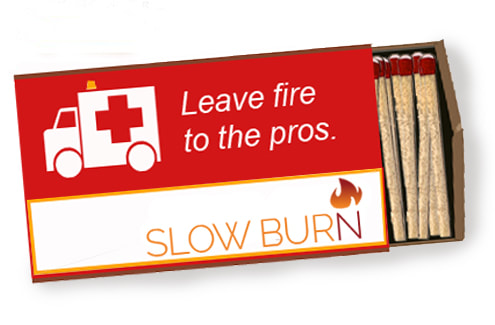|
Your founder creates a brand name that contains the letter "L" many times.
Why? So, to a Japanese buyer, it sounds western. (If you are unaware, the Japanese have difficulty pronouncing the letter "L.") A decade after selling your first pair of pants, your IPO raises almost $328 million. For three years in a row, your brand ends up on a majorpublication's list of fastest growing companies. You become known for using "holistic guerrilla marketing." You want your customer to feel that they are part of a larger community. But then come the controversies. One line of clothing made from seaweed provides "anti-inflammatory, antibacterial, hydrating and detoxifying benefits." But independent lab tests disprove that claim. You have to stop claiming it. Next, customers are complaining of poor quality. Products are falling apart after just a few uses. Oops. Some of your reusable bags are recalled for containing high amounts of lead Then, everyone's favorite media laugh-fest. Turns out, a very expensive pair of pants is too thin. They become transparent. You recall 17% of your entire inventory. Major cost. Bad press. The Chief Product Officer resigns. Then, your founder mocks how Japanese customers pronounce the brand name. (Remember all those instances of the letter "L"? What's he thinking?) The founder is asked why there are no clothes for plus-size women. He says it's because they're too expensive to make. Customers complain about fabric pilling. The founder blames it on women wearing it wrong. And on having body shapes inconsistent with the clothing design. He says some women's bodies are inconsistent with the brand's clothing. When the founder is forced to resign, some folks are unsurprised. Later, the founder publishes an open letter to shareholders. He says the company is losing ground to competitors. The founder launches a website specifically to criticize the company, which has lost its way. (Based on what got him fired, I'm wondering: what was the company's way in the first place?) And now, the latest media giggle... "Resist Capitalism." The brand is being ridiculed for using that phrase. That idea is one component of a "Decolonizing Gender" yoga workshop it promoted. And that is how the firestorm of scorn and mockery comes raining down upon the brand. It happened last week. The brand is a lightning rod. The media delights in whipping it. But what is the truth? The truth is that the brand did not create the event. A brand ambassador created it. But the company shared it on their social media feeds. It seems nobody in charge of social had the good sense to question the message vis à vis the brand. Hello, communication overload! In this over-fast, overcommunicated culture, many in charge of communicating are overwhelmed or underqualified. Or both. Neither you nor I will ever have an international, multi-billion-dollar brand. (Nothing personal.) Nonetheless, the small-business brands we do have are still judged by how they make people feel. Our customers pay attention. How do our brands behave? How are our customers speaking of us? The good news: at least this ridiculed brand is being talked about. And as that gender-challenged gentleman from The Old Country once said, "There's only one thing worse in the world than being talked about, and that's not being talked about." Yes, we have to be judicious about what we say and how we behave. But we still have to do things that are worth talking about. We each have to make our customer feel something. We just have to hope we are being on-brand. And not looking like idiots. Got courage? LAST CHANCE FOR FREE... It's going away soon, because it is now on amazon Kindle for $19.95. Get the last remaining free copy of Lightning Branding: How to Generate Revenue Faster With An Electrifying New Brand right here. For details about our new Lightning Branding courses, both do-it-yourself and we-do-it-with-you editions, click here. (There's even a video of us!) Cheers, Blaine Parker Your Lean, Mean Creative Director in Park City
0 Comments
 YOU THOUGHT I'D FORGOTTEN ABOUT YOUR CARDS AND LETTERS, HADN'T YOU? Not so, dear reader. There are still several of Q4 2015's burning questions to be answered. It's just that other, more urgent topics had gotten in the way. Like, the idea of flying to the British Virgin Islands for elective plastic surgery, and slaying the vile beast that is Puppy Monkey Baby. But here now, we are returning to answer yet another burning question from the trenches. THIS ONE COMES FROM ONE OF THE RELENTLESS WEEKLY SCREED'S MOST RELENTLESS READERS This is a man who is entirely too smart to even be here. Why he hangs around is a mystery. Besides being an enormously talented engineer, voiceover performer and web designer, he is also notable for having toured the world as a sideman with some of the classic stadium rock bands. He has recently retired from a job where he was warping the minds of America's youth at a hugely expensive university in Southern California. You can understand how one might be humbled to find that this professor/engineer/musician not only reads but actually pays attention to this wretched drivel. So, for The Professor, we now address his Burning Question--which (unsurprisingly) was stated in the form of an essay. Ready? "I'D LOVE TO SEE A SCREED OR TWO ON SOCIAL MEDIA USE BY SMALL BUSINESS ADVERTISERS... "...particularly solopreneurs, and especially on Facebook (and to a lesser extent, Twitter). "We've all seen VO talent (and some companies!) who think they're helping themselves by posting their current projects, successes, and more on social media, where they primarily reach... "...wait for it... "...their competitors. "Obviously there's no positive ROI to be had there. "So shall the solopreneur just blow off social media altogether and focus on some other channel? Is it as simple as eschewing FB? Or Twitter? "Or is it all about the content, and the targeting, and it matters less where it goes than what it is that's going there? "(I suspect I've answered my own question, dammit!)" THANK YOU AND GOOD NIGHT! Yes, a greater smartass than myself would sign off here. The reason that's not happening is I feel The Professor's pain. This is a challenge that has dogged me for years. What professional traction is there to be gained from using social media to be social with your competitors? And what is the solution? So really, we have two burning questions. More, if you really drill down. So maybe the overarching question is... WHAT THE HELL AM I DOING IN SOCIAL MEDIA AND DOES IT MAKE ANY SENSE? First, let's talk about the idea of reaching competitors versus prospects. What is it that you're trying to accomplish with your social media presence? Both the Professor and I know a voiceover performer whose social media reaches primarily his competitors. And while he talks about his "current projects, successes, and more," these posts do something really useful. They help establish him as an authority within his peer group. This man is monumental. Not to mention humble to boot. REACHING HIS COMPETITORS HAS BEEN USEFUL IN BUILDING A FAN BASE AMONG HIS COLLEAGUES A different example, and perhaps even simpler to grasp: there are ad agency copywriters who are primarily about reaching their colleagues on Facebook and Twitter. There's one of several copywriters I follow on Twitter. He posts things such as: "Albacore is tuna that Jessica Alba has rubbed on her tummy." "I'm having a really hard time convincing myself to eat a box of soup instead of running for fast food." "Minestrone is an Italian word that means 'explodes in microwave.'" He obviously has a penchant for humor, creative thinking and vivid imagery. How is this useful? Because in the advertising agency world, agency copywriters often end up getting hired by other agency copywriters. COMPETITORS, YES--BUT ALSO COLLEAGUES Proving one's worth to one's professional colleagues can be extremely valuable over the long haul. It can also be especially useful if, as part of your livelihood, you sell information products and consultations to those colleagues. But going back to the original question, how does posting "current projects and successes" benefit the social media user? It depends. If it serves as social proof of one's authority, it can help build the brand. But what if you run, say, a yoga studio? Does it make any sense to reach other yoga studios? Perhaps. It depends what your studio is about and what you post. Should you be reaching ONLY other yoga studios? No, that would be silly. But reaching other yoga studios makes sense, because a) you should know what your competition is doing, b) you should be able to establish authority, and c) other yoga studios attract other yoga students-who might eventually be attracted to you. And who doesn't want to maybe attract the competition's customers? THE BIGGER QUESTION IS: WHAT'S YOUR BRAND STORY AND ARE YOU STICKING TO IT? If you have properly defined who you are as a solopreneur or a business, you should have no problem standing out in social media. If you understand the one way your friends and followers should feel about your business, sticking to that line and continually offering material to support that feeling should be a piece of red velvet cake. Should your competitors know about your successes? Sure! Whether you're a yoga studio, a copywriter, a high-end audio store or an electrical engineering firm, it's all about PR. It's about continually defining who you are. It's about letting the marketplace know how and why you matter. DOES THIS ENGENDER PROFESSIONAL JEALOUSY? Possibly. But jealousy is a small-minded emotion and not worthy of consideration. To borrow from the famous Robert Heinlein, "A competent and self-confident person is incapable of jealousy in anything. Jealousy is invariably a symptom of neurotic insecurity." Posting current projects and successes (assuming you don't brag, of course) helps raise your profile, both with your friendly competitors and with your customers. For example, I recently posted about a VO session I did with Leo Burnett. In Beirut. That's certainly unusual and vaguely interesting. SOCIAL MEDIA COULD REALLY BE CONSIDERED A FORM OF ONGOING MICRO PRESS-RELEASES Or an ongoing tradeshow. Or an ongoing business networking function. Yes, there should be an ongoing effort to reach one's customers. But there is no problem with also reaching competitors. There are certainly times when I've recommended my competitors to do work for which I'm not right. (This is especially so when someone's looking for female voice talent, and my one female voice impersonation is inappropriate.) COMPETITORS CAN BE A GREAT SOURCE OF BUSINESS Referrals and recommendations form a collegial social media base can be immensely valuable. LinkedIn is especially a place where this kind of interaction happens. Yes, you might be competitors today, possibly even vying for the same job. But tomorrow, one of you could be looking for a person who does exactly what the other one does. And the better you've defined your brand, the more likely you are to be top of mind in such a situation. The alternative to reaching competitors with social media is to be invisible to them--which is of little to no benefit. In the long run, it's "all about the content, and the targeting, and it matters less where it goes than what it is that's going there." To borrow from The Professor and super genius who started this ball rolling, maybe he did answer his own question. AND MAYBE ALL I DID WAS ELABORATE ON IT FOR ABOUT 1,000 WORDS At least I'm smart enough to recognize when someone smarter than me hands me a gift and lets me run with it. Because really, that's what I do for a living. Sometimes, that gift is buried beneath tons of other material. But branding small businesses is about uncovering the small business's gift to the customer, then figuring out how to help the business put that gift on display. And whether it's seen by a customer or a competitor makes no difference. Ultimately, it has the same effect: it makes one person feel one way about your business. And therein lies the power. |
AuthorBlaine Parker is prone to ranting about any and all things related to brand. In many ways, he is a professional curmudgeon. While there is no known vaccine for this, the condition is also not contagious. Unless you choose it to be so. Archives
February 2022
Categories
All
|
|
© Copyright 2020 Slow Burn Marketing LLC |


 RSS Feed
RSS Feed

